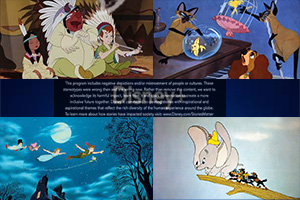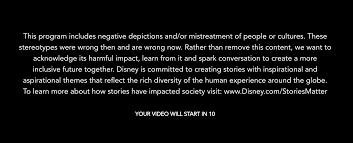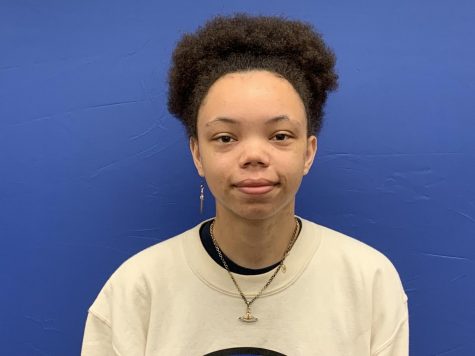Not You, Too, Disney!
Disney feels the pressure from Cancel Culture when it comes to some of its classic movies from the past.

April 15, 2021
The injustices that truly exist in the world today are getting buried under the mounds of soil created by those bent on digging up the dirt from America’s past. It is to the point where no one or no event is immune–not even Disney.
The past three years, a Cancel Culture mindset has been gaining in momentum in this country–to the point of hysteria in some cases. People have been unjustly called out as being racists, sexists, homophobes, and many other derogatory labels. Cancel Culture has ranged all the way from white women being bashed for operating a Mexican taco truck, to people not being allowed to wear a different culture’s hairstyle, to innocuous statements that can be twisted into offensive slurs. People–especially celebs–are continually being called out and “canceled”: J.K. Rowling, Ellen Degeneres, Lea Michele, and even Theodore Giesel—yes, Dr. Seuss!
But, it’s not only people getting offended about what’s being said at present. Now, the Cancel Culture police are probing back into things from the past–things like movies. Films and television shows created during a different cultural climate and were once referred to as “classics” are suddenly deemed as offensive. Effects of this are even seen on Disney Plus. If Disney fans go to watch certain films, such as Aladdin (1992), Dumbo (1941), and The Jungle Book (1967), there now will be a warning of “outdated cultural depictions” that pops up. Since Cancel Culture is so pervasive these days, no one should really be surprised that Disney has acquiesced. Fortunately, they haven’t pulled their films entirely.
Before Cancel Culture took root–when people didn’t get offended over everything–no one had a problem with any of these types of older films. They saw them for what they were and when they were made. Today, though, it seems as if some people look at life through just one lens. Disney admits that certain parts of their films may now be seen by some as insensitive by today’s standards. However, their intent wasn’t to be racist; it was merely to entertain. Ultimately, Disney decided to put warnings on the shows in October as a form of damage control.
One movie in question was The Aristocats (1970). Some are claiming that the way Disney represented the cats is offensive. The history behind Siamese cats is that they are Asian cats. Therefore, to the Cancel Culture, it is ridiculing the Chinese culture. So, for a Siamese-Asian cat to be playing with chopsticks cannot be viewed as simply cultural; it must be racist. In reality, it’s hard to see what’s offensive about it. AND, consider this: chopsticks have a rich history behind them; they go back all the way to 1200 B.C. So, maybe the problem is not so much with what was depicted but who was depicting it. Winston Hibler was the creator/producer of the movie. He is a White-American, and maybe that has something to do with people’s anger. If he had been Asian, would critics have cared?
On the other hand, it’s understandable why people of certain cultures have gotten upset about some of what has been going on in the world. There have been lots of instances of racism to all different types of people throughout history. Great examples include Hitler’s treatment to Jews, slavery of any human both here and in other countries, the Chinese Massacre of 1871, the ongoing genocide in Rwanda. This list of inhumane treatment to others is never-ending. When viewed in this context, getting upset about two Siamese cats using chopsticks in a cartoon made over 50 years ago seems rather insignificant. Every culture is different. People talk, look, and act differently, so it’s important to welcome their differences, not cancel them. And, people need to be able to differentiate between when someone is being made fun of and simply when fun is being made.
Take Peter Pan, for example. Disney portrayed the Native people in a stereotypical manner. But, was it offensive? Was it racist? Granted, the film doesn’t really show the authentic Native traditions–which is why so many people had problems with it–but, was this movie intended as a documentary on Native Americans or an adventure into Neverland? In it, terms like “Redskins” should be viewed more a sign of the times–a nickname–than a sign of disrespect–a racial slur. People watching it today do not need a warning label to let them know that Peter Pan was filmed in a different cultural climate. That’s what parents are for–to enlighten their children about the past and guide them toward their future.
Like so many of her peers, Elkhart-East sophomore Sarah Fisher has no problem separating the past culture from the present. “I see where they are coming from,” she says, acknowledging how those offended may feel. “If I were of their ethnicity, I might not have understood. But,” she adds, “I usually don’t get offended easily either.” As for the Cancel Culture mode that exists presently in society, she says this: “I really dislike Cancel Culture, because it’s very negative. I wish people could take jokes and not try to put others down just because of different opinions.”
Fisher also realizes that society is not quite ready for that just yet. She also hopes that Disney is not quite ready to throw in the towel. “I really enjoy Disney, and I understand the disclaimer,” she concludes. “I’m glad they didn’t just take off all the movies.”








Lindsay Nilsen • Apr 16, 2021 at 9:59 am
Such interesting things happening in the world that I wouldn’t have noticed if it wasn’t for this article. Thanks for sharing Jane!